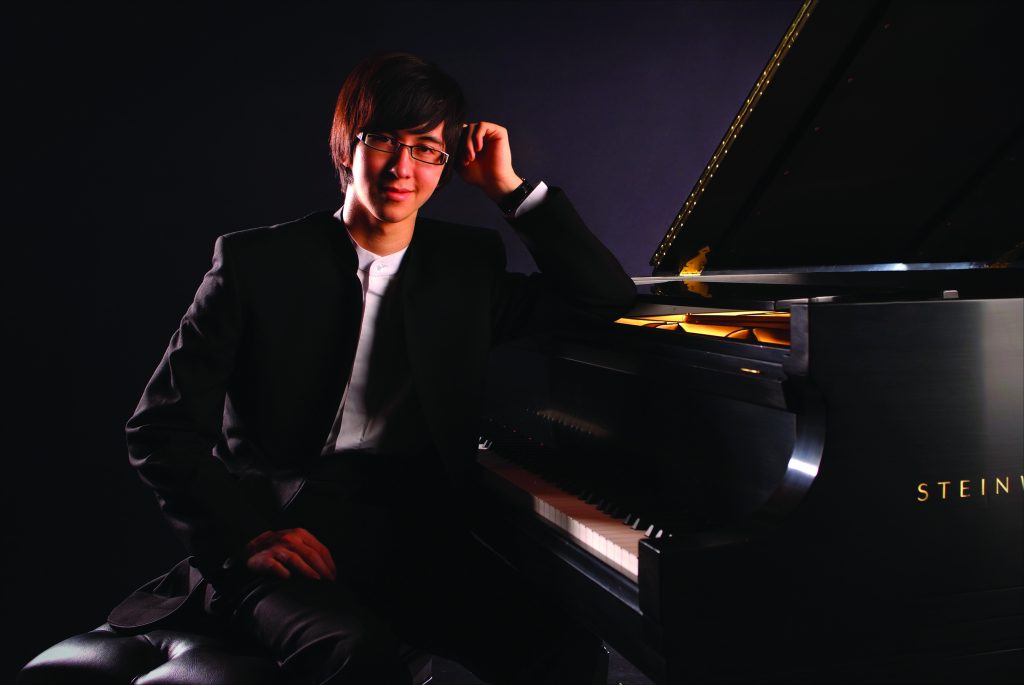
Charlie Albright is one of those tremendously gifted people who has conquered the world of music and academics with equal aplomb, holding a bachelor’s in pre-med and economics (Harvard) and a master’s in music (New England Conservatory).
Now in his early 20s, the Centralia, Wash., native has already had a long and impressive career, playing with major orchestras and collaborators, winning big competitions and sweeping up prestigious awards such as the Avery Fisher Career Grant in 2014.
And so it comes as no surprise to hear him live and find him a very accomplished musician, someone for whom no technical challenge seems insurmountable. You couldn’t help but be astonished at the way he tore through most of his program Feb. 26 at the Society of the Four Arts, most of which contained music at the highest level of difficulty.
But he is a long way from musical maturity. His taste runs to the extremely showy, and with only a couple exceptions, he rarely demonstrated any real interpretive depth. He is a modern-day successor of the celebrated 19th-century Romantic keyboard virtuosos such as Henri Herz and Friedrich Kalkbrenner: Pianists whose aim was to astound their audiences, usually with showpieces like concert paraphrases of popular operatic tunes; the most immediately appealing pieces of the weightier repertoire; and a barnburner or two of their own.
That’s not, in itself, a bad thing. The concert world needs performers like this to increase the fun quotient. Lang Lang is perhaps the most well-known example of this kind of player, and he shares with Albright energy, enthusiasm and an enormous facility that has to be expressed.
The concert opened with what in retrospect were probably his best performances, musically, of the afternoon: Two of the Op. 90 impromptus of Franz Schubert, No. 3 in G-flat, and No. 2 in E-flat. In the first of these, the most famous of the impromptus, he played with a long line, pretty tone and tasteful restraint, which let the piece sing out. The piano sounded somewhat noisy, which was exacerbated by Albright’s making the accompaniment figures more articulated than you usually hear.
In the second, the endless triplets of the main theme were rolled off with beautiful evenness, betraying not a trace of effort, though without much lift in the left hand. In the contrasting drama of the minor-key middle section, he was more eccentric, with odd accents here and there to make the music more violent than it really is.
Still, this was good Schubert playing overall, and he has a real affinity for this music. He followed that with an improvisation based on four notes called out from the audience (A, F-sharp, B-flat, D-flat). What came out was a tempestuous, darkly colored etude heavily influenced by Chopin and Brahms, and entirely in the spirit of the late 19th century, but with a couple tasteless glissandi thrown in.
The next piece was also a throwback, the Blue Danube Arabesques (Op. 12) of the otherwise completely forgotten Polish pianist and composer Adolf Schulz-Evler (1852-1905). It’s surely been decades since any pianist came through South Florida with this piece, which hews fairly closely to the familiar Johann Strauss II waltz that it varies; what Schulz-Evler does, more or less, is elaborate extravagantly on the music that’s already there. It’s Liszt Lite, but Albright is very good at this sort of thing, and he tossed off its multitudinous difficulties persuasively. The writing tends to be very straightforward and not very imaginative, and Albright could have helped its case with more contrast and style.
One of the motifs Albright made from the four notes in his improv was a close cousin to a motif in the next piece, the Variations (Op. 41) of the contemporary Russian jazz pianist and composer Nikolai Kapustin. This composer has cranked out virtuoso jazz works for the piano by the yard, and they are always dazzling and a brilliant representation of the greatest past masters of the jazz piano.
The theme of this set is the opening bassoon solo of Stravinsky’s Rite of Spring, and Kapustin takes it through its paces very much in the style of the legendary Art Tatum, with a stride background and blisteringly fast shifts of harmony. Albright played it spotlessly, with plenty of verve and real fire in the final Prestissimo section, though again, he could have done more with the slow reveal of the theme in the middle.
The second half was devoted to the entire Op. 25 collection of Etudes by Frederic Chopin. Albright gave charming prefatory remarks before all his pieces, and for the Chopin, he took the audience through the varied nicknames these works have attracted over the 180 years since they were composed. Albright has all the technical skill he needs to play these masterworks, and his fingerwork was brilliant at all times.
He was less good at the long line, particularly in the E minor Etude (No. 5), in which the middle section was more matter-of-fact than endearing, and sounded like it came from a different piece. And for all his technical wizardry, the C minor Etude (No. 12) was more controlled, less over-the-top than I expected from the rest of the recital. These were very fine performances overall, but without much time spent exploring their individuality; they sounded like challenges to be met, not emotional constructs to be examined.
The audience adored him, and called him back for two encores: The Liszt transcription of Robert Schumann’s song “Widmung,” which he played persuasively, and the contemporary Russian pianist Arcadi Volodos’s hair-raising transcription of Mozart’s Turkish March, from the Sonata in A, K. 331. The Volodos is immensely vulgar, but it certainly grabs the attention, and it was loudly acclaimed.
Editor’s note: The posting of this review was delayed by technical difficulties.